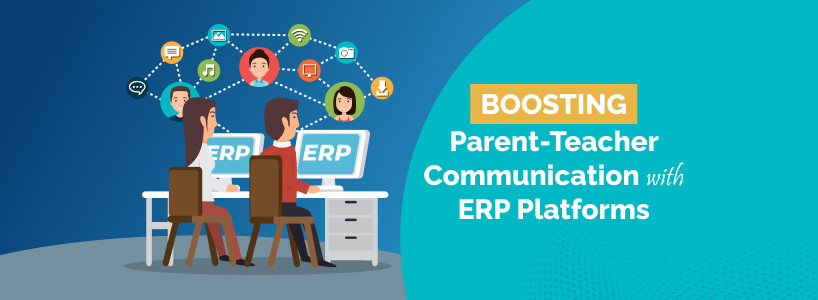Boosting Parent-Teacher Communication with ERP Platforms

In todays fast-paced world, effective communication between parents and teachers is vital for student success. As educational institutions evolve, traditional communication methods such as diaries, phone calls, and in-person meetings are becoming less effective or scalable. This is where ERP EduAutomate platforms step in, transforming the way schools manage and enhance parent-teacher interactions.
A robust School ERP system serves as a centralized platform that integrates academic, administrative, and communication functions. With digital tools becoming essential for educational operations, ERP platforms are revolutionizing school management and making parent-teacher collaboration seamless, timely, and data-driven.
Real-Time Updates and Notifications
One of the key benefits of ERP platforms is real-time communication. Parents can receive instant updates about their child's attendance, academic performance, homework, examination schedules, and behavior reports. This eliminates the delay associated with manual reporting and enables proactive involvement in the childs academic journey. Teachers can share class progress, highlight concerns, or send appreciation notes effortlessly through the system.
User-Friendly Communication Channels
Modern ERP systems feature built-in messaging and notification modules. These tools make it easy for teachers to contact parents individually or in groups, ensuring that important announcements or feedback arent lost. For parents, the convenience of accessing information through mobile apps or online portals enhances their engagement and satisfaction.
Increased Transparency and Trust
When parents are consistently informed, it builds trust and transparency. ERP platforms allow schools to maintain detailed records accessible to both staff and parents. This includes exam results, fee payments, and disciplinary actions. Such openness fosters a collaborative environment where both parties work toward the student's best interests.
Simplifying Scheduling and Meetings
Scheduling parent-teacher meetings can be a hassle, especially in large schools. ERP platforms streamline this process by allowing digital appointment booking, automated reminders, and even virtual meetings via integrated video conferencing tools. This saves time and encourages higher parent participation.
Data-Driven Insights for Better Decision-Making
With a centralized data repository, ERP systems offer valuable analytics for teachers and school administrators. These insights can highlight learning patterns, attendance issues, or behavioral trends that may require parental intervention. When shared with parents, such data enables informed discussions and effective solutions.
Choosing the Right ERP Platform
When selecting an ERP system, schools should consider features like scalability, mobile accessibility, integration options, and data security. An ideal solution should not only streamline operations but also enhance the school management system with intuitive communication tools.
Moreover, investing in a reliable school communication app ensures that all stakeholders remain connected, no matter where they are. With more parents using smartphones and expecting digital convenience, these tools are no longer optionaltheyre essential.
Conclusion
Boosting parent-teacher communication is no longer a challenge with ERP platforms. By leveraging digital tools, schools can foster a more collaborative and transparent educational environment. As technology continues to reshape education, ERP systems stand out as a smart investment for future-ready schools.
Add a Comment
Your email address will not be published. Required fields are marked *
Categories
Popular Posts
![Customer, Lead, or Deal? Understanding CRM Sections for Smarter Sales [thumb]](https://blogimages.weblink.in/customer-lead-or-deal-understanding-crm-sections-for-smarter-sales-350x128.jpg)
Customer, Lead, or Deal? Understanding CRM Sections for Smarter Sales
![How EduAutomate Brings Real-Time Visibility to All Admin Operations? [thumb]](https://blogimages.weblink.in/how-eduautomate-brings-real-time-visibility-to-all-admin-operations-350x128.jpg)
How EduAutomate Brings Real-Time Visibility to All Admin Operations?
![How CRM Vendor Management Enhances Your Procurement Process [thumb]](https://blogimages.weblink.in/how-crm-vendor-management-enhances-your-procurement-process-350x128.jpg)